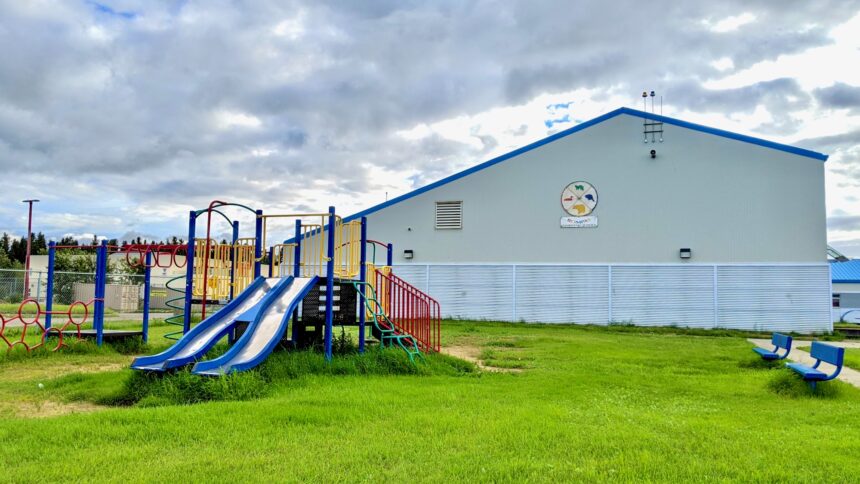Article – As storm clouds gathered over Fort Simpson last Tuesday, they mirrored the tension inside Dehcho First Nations headquarters where parents, elders, and community leaders voiced their frustrations about the region’s education system to NWT Education Minister Caitlin Cleveland.
“Our children are graduating without basic skills. Some can barely read or write,” said James Hardisty, a father of three and former chief from Wrigley. “We’re setting them up for failure, not success.”
This wasn’t just another community meeting. The emotional testimonies prompted Cleveland to announce an unprecedented step – a formal investigation into the Dehcho Divisional Education Council (DDEC), which oversees schools across the region serving approximately 550 students.
The investigation comes after years of community concerns about graduation rates that hover around 40 percent – significantly below the territorial average of 56 percent according to the NWT Bureau of Statistics. Parents have increasingly questioned whether the education their children receive prepares them for higher education or employment opportunities.
Cleveland told the gathering she was “deeply troubled” by what she heard. “When communities speak with such clarity and consensus about their children’s futures, we have a responsibility to listen and act,” she said. “This investigation isn’t about placing blame – it’s about finding solutions.”
The minister’s decision marks only the second time in territorial history that an education authority has faced such scrutiny. The investigation will examine everything from classroom resources to cultural programming and administrative practices.
For many Dehcho residents, the investigation represents long-awaited recognition of problems they’ve highlighted for years. Sarah McLeod, who teaches Dene Zhatie language programs in Fort Simpson, described submitting concerns about curriculum gaps to the DDEC repeatedly since 2019.
“We keep getting told things will improve, but nothing changes,” McLeod explained. “Our language programs lack consistent materials, and our cultural teachings aren’t properly integrated into daily learning.”
The investigation will be led by former Tłı̨chǫ educator and administrator Marie Washie, who brings over 30 years of experience in northern education systems. She’ll work with a small team to conduct interviews, review academic outcomes, and analyze operational practices across the region’s six schools.
DDEC chairperson Renalyn Pascua-Matte acknowledged the challenges but defended the council’s efforts. “We’re working with limited resources across vast geographic challenges,” she said in a written statement. “We welcome the investigation as an opportunity to address systemic issues that hamper our ability to deliver quality education.”
The region’s unique circumstances certainly present challenges. The Dehcho encompasses approximately 215,000 square kilometers with communities scattered across remote areas, making resource distribution and teacher recruitment particularly difficult. Schools in smaller communities like Wrigley and Nahanni Butte often struggle to retain qualified staff.
However, parents like Christine Hardisty from Jean Marie River say these challenges shouldn’t excuse fundamental gaps in education quality. “My daughter graduated last year and is now struggling in her college courses because she wasn’t properly prepared,” Hardisty told the gathering. “This isn’t just about resources – it’s about accountability.”
Cleveland has promised a transparent process with the investigation’s findings to be made public by February 2025. The timeline allows for community consultations throughout the fall and a comprehensive review of educational outcomes over the past five years.
Dehcho First Nations Grand Chief Herb Norwegian sees the investigation as potentially transformative. “This could be a turning point not just for education but for our youth’s future,” Norwegian said. “But we need to ensure Indigenous knowledge and priorities remain central to any solutions.”
The territorial government faces its own questions about funding models that many educators believe disadvantage smaller, remote schools. A 2022 report from the C.D. Howe Institute found that per-student funding in the NWT varied dramatically between larger centers and smaller communities, despite higher operational costs in remote areas.
Cleveland acknowledged these systemic issues during the meeting. “This investigation isn’t happening in isolation from larger questions about how we fund and support education across the territory,” she said. “The lessons we learn here could inform broader changes.”
For students like 17-year-old Michael Sabourin from Fort Simpson, the investigation represents hope. “I want to study engineering after graduation, but I worry my math skills aren’t strong enough,” he said. “We deserve the same opportunities as kids in Yellowknife or Edmonton.”
As the meeting concluded, Cleveland committed to returning to the region once the investigation’s findings are compiled. “This is just the beginning of a process,” she told the gathered community members. “Your voices have been heard, and they will continue to guide this work.”
With winter approaching in the Dehcho, community members left the meeting with cautious optimism. The storm clouds had passed, at least temporarily, replaced by the possibility that meaningful change might finally be on the horizon for the region’s education system.






